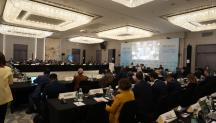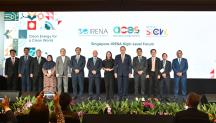

Renewable Energy for Agri-food Systems: How Cross-Sector Partnerships are Driving Action and Investments
Newsletter
When we think of food, we don’t typically think about the energy it takes to produce it. But in fact production and agriculture consume about 30% of the world’s energy production – primarily fossil fuels. And of the total greenhouse gas emissions stemming from agri-food systems, energy comprises about a third. So the stakes are high when it comes to transitioning agri-food systems to renewable energy.
This is not the only reason the stakes are high, however. Poor access to energy leads to significant food losses and lower crop yields while hundreds of millions of people still suffer from the health costs of traditional wood energy for cooking. As a result, action will contribute to meeting the goals of both the Paris agreement and the Sustainable Development Goals (SDGs).
On 11 November, experts gathered at the IRENA Pavilion to discuss the challenge of decoupling food production from fossil fuels without diminishing food security. The event was co-hosted by IRENA and the FAO, in partnership with the International Fund for Agricultural Development, and was a follow-up to a joint IRENA/FAO report released at COP26 Renewable Energy for Agri-food Systems: Towards Sustainable Development Goals and the Paris Agreement’ that laid out a concrete action agenda to scale-up investments in renewables in the agri-food sector. The action plan was formalized in a joint Energy Compact that was Announced at the UN High Level Dialogue on Energy in 2022.
The focus of the session looked was the cross-sector partnerships which are driving both action and investment, and how they can be used to break down silos to mobilize the necessary capital. One of key points in the action plan was about how to get more investments flowing into nexus solutions, reach last-mile farmers and agri-enterprises, and the greater use of renewables to support their transitions. In her opening remarks Maria Helena Semedo, Deputy Director General, FAO, noted that in many ways, the energy-agriculture nexus touches on every aspect of society, economy and environment, directly or indirectly. She pointed out that 30% of sub-Saharan Africa has no access to electricity, and that we will not achieve the transition to a renewables-based energy system, with universal access, if every country every sector tries to do it alone. Indeed every speaker noted the importance of taking a holistic approach to the challenge.
IRENA DDG Gauri Singh pointed out that scaling up the use of locally-available and increasingly affordable renewable energy solutions can be an effective way of meeting growing energy needs in the sector, whether for electricity, heating/cooling or transport. “In contrast, continuing to rely on fossil fuels to meet energy needs in the agriculture sector brings challenges associated with price volatility and supply shocks, in addition to the steep environmental cost.”
Nicole Iseppi of the Bezos Earth Fund emphasized the need for nature-based solutions, noting that 50% of land globally is used for food production, while one in three people globally face food security issues. Harish Hande, Co-Founder of the SELCO Foundation suggested that an ecosystem approach to agriculture is essential.
Ms Singh expressed the hope that by next year’s COP there would be a strong global initiative focussed on investments for initiatives at the nexus between food and energy security. If successful, this will go a long way towards making a climate-safe future, and consigning hunger to the past.




